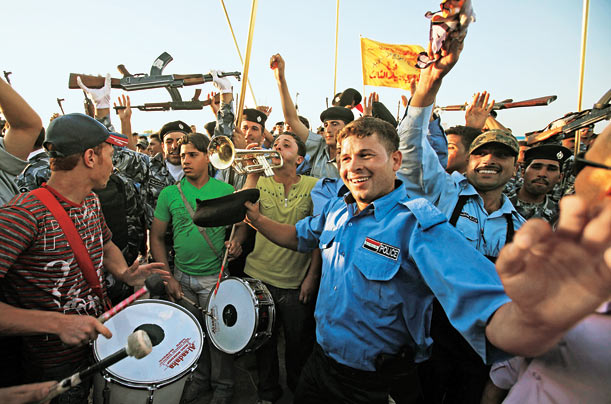
The decision to pull U.S. troops out of Iraq's cities by June 30 was made by Iraqis, not Americans. That's why the Iraqi government held a massive celebration to mark the redeployment of forces as National Sovereignty Day. Now Iraqi citizens and U.S. troops hovering in the countryside are holding their breath, watching to see if Iraq can protect itself.
Most U.S. forces have, in fact, been out of Iraq's urban areas for weeks, corralled into large rural bases. But until recently, they had continued to patrol the two largest cities plagued by ongoing violence — Baghdad and Mosul. Now residents will no longer see U.S. troops rumbling along their boulevards in heavy armored vehicles, a persistent and painful reminder of Iraq's dependency on foreigners for its security. "We feel confident in the Iraqi forces continuing the process of taking over the security tasks in their own country," said General David Petraeus, commander of all U.S. forces in the Middle East, on June 29.
Iraqis, for their part, didn't wait for the withdrawal to take effect before beginning their celebrations, with patriotic songs blaring from police and military outposts as Iraqi-operated military vehicles cruised the streets. Prime Minister Nouri al-Maliki has hailed the U.S. pullout from urban areas as a "great victory" that frees the nation from foreign occupiers. But in a sign of the challenge that will face his forces, 437 Iraqis, including 372 civilians, died in June, the bloodiest month in a year.
It's too early to know if those attacks are leading indicators of a resumption of the civil war or a nihilistic lashing out by the losing side. Some in the Pentagon and Iraq believe the aim of the bombing campaign is to show Iraqis that al-Maliki and his security forces are unable to protect them — few recent attacks have targeted U.S. troops. But one thing is clear. Iraq began as America's war, George W. Bush's war. Today, for better or worse, ownership of it has passed not to Barack Obama but to Nouri al-Maliki and the government of Iraq.